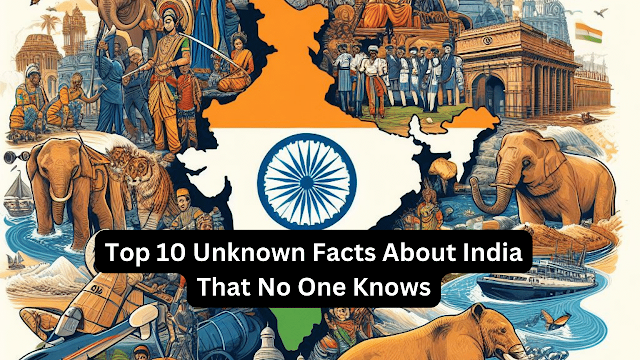Top 10 Unknown Facts About India That No One Knows
Dive deep into the vibrant tapestry of India and
uncover the Top 10 Unknown Facts About India
That No One Knows
about this incredible land! From ancient
secrets to modern marvels, prepare to be amazed.
Introduction:
Top 10 Unknown Facts About India That No One Knows
India, a land steeped in rich history, vibrant
culture, and diverse landscapes, is often associated with iconic landmarks like
the Taj Mahal and bustling metropolises like Mumbai. However, beneath the
surface lies a treasure trove of lesser-known facts that paint a truly
captivating picture of this multifaceted nation. So, buckle up and get ready to
explore the Top 10 Unknown Facts About India
That No One Knows
Top 10 Unknown
Facts About India That No One Knows
1. The Cradle of
Chess:
Did you know the game of chess, a strategic battle of
minds, originated in ancient India? Called "Chaturanga" in its early
form, it evolved over centuries before reaching the global stage we know today.
2. Snakes &
Ladders:
A Homegrown Classic: Remember that childhood game of
navigating snakes and ladders? Believe it or not, this beloved board game also
has Indian roots! Known as "Vaikuntapali" in Sanskrit, it represented
the journey of life, with ladders symbolizing virtues and snakes signifying
vices.
3. Land of the
Ancient Martial Art:
Kalaripayattu, a dynamic and powerful martial art
form, predates even karate and kung fu. Developed in Kerala over 2000 years
ago, it uses flowing movements and weaponry, showcasing India's rich martial
heritage.
4. The World's
First University:
Nalanda University, established in the 5th century BC,
flourished for centuries as a global hub of learning. Attracting scholars from
across Asia, it offered diverse subjects, making it a true pioneer in higher
education.
5. A Nation of
Inventors:
From the revolutionary number system we use today to
the game of Snakes & Ladders, India has a long history of innovation.
Aryabhata, an ancient mathematician, even calculated the value of pi with
remarkable accuracy!
6. Home to a
Natural Wonder:
The Living Root
Bridges of Meghalaya, woven from the aerial roots of fig trees, are living
testaments to human ingenuity and nature's collaboration. These bridges, some
centuries old, are strong and sustainable, showcasing India's unique ecological
marvels.
7. Spice Up Your
Life:
India, dubbed "the Spice Coast" by ancient
traders, is the world's largest producer of spices. From the fiery chilies to
the aromatic cardamom, these flavorful treasures have influenced cuisines
worldwide for centuries.
8. A Linguistic
Powerhouse:
With 22 official languages and hundreds of dialects
spoken across the nation, India boasts incredible linguistic diversity. This
rich tapestry of languages reflects the country's multicultural heritage and
vibrant communication landscape.
9. Where Diamonds
Sparkled First:
Long before other sources were discovered, India was
the sole supplier of diamonds for over 2,000 years. The Golconda mines,
legendary for their quality gems, adorned emperors and ignited global
fascination with these precious stones.
10. A Haven for
Tigers:
India is home to over 70% of the world's wild tiger
population, making it a crucial player in tiger conservation. Project Tiger, a
national initiative, has seen significant success in protecting these majestic
creatures, offering hope for their future.
Conclusion:
These are just a glimpse into the many hidden gems
that India has to offer. As you delve deeper, you'll discover a land brimming
with ancient wisdom, modern marvels, and a vibrant tapestry of cultures. So,
next time you think about India, remember these Top 10 Unknown Facts About India That No One Knows embarks on your own journey to uncover the magic of
this incredible nation.
Recommendations:
- Visit India and experience its diverse culture and landscapes firsthand.
- Read books and articles about Indian history, mythology, and traditions.
- Explore Indian cuisine and try new spices and flavors.
- Learn a few basic Hindi phrases to connect with locals on your travels.
FAQs:
Q: What is the
most popular religion in India?
A: Hinduism is the most popular religion in India,
followed by Islam, Christianity, Sikhism, and Buddhism.
Q: What is the
national language of India?
A: Hindi is the official language of the Union
government, but India has 22 official languages recognized in the Constitution.
Q: What is the
capital of India?
A: New Delhi is the capital of India.
